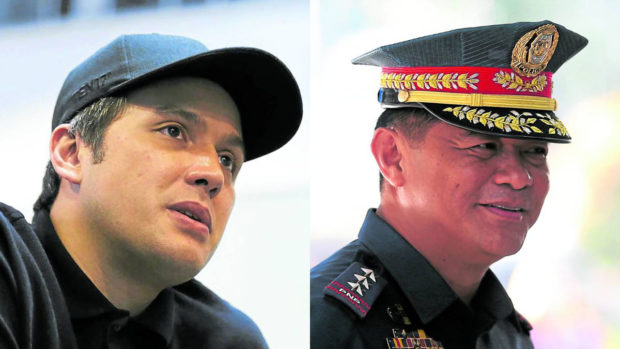
Paul Soriano and Camilo Cascolan. (INQUIRER FILE PHOTOS)
MANILA, Philippines — Saying his intentions were “misunderstood,” President Ferdinand Marcos Jr on Wednesday took time to explain why he hired his wedding godson, filmmaker Paul Soriano, as his adviser on creative communications, and former Philippine National Police chief Camilo Cascolan as undersecretary of the Department of Health (DOH).
Fielding media questions on the sidelines of the National Information and Communications Technology Summit in Manila, the president sought to justify the new appointments that had sparked controversy on social media.
He said “people have misunderstood” his decision to give the new post to Soriano, husband of celebrity entertainer and another Marcos supporter Toni Gonzaga.
Not part of PR machine
“He’s not there to be part of the PR machine. He’s there to find ways to promote the creative industry because that’s where he’s from,” Marcos said of Soriano.
The Philippines, he said, has a pool of talents in the film, music, and entertainment industry — and “we have to project that to the rest of the world.”
“That is the job of Paul. So I hope that clarifies that,” he said.
In an earlier statement, the president emphasized creativity as one of the Filipino people’s greatest assets and the government must find many ways to “highlight that to the rest of the world.”
Soriano, who directed the president’s first State of the Nation Address in July and his election campaign ads, took his oath of office before Marcos in a closed-door Palace ceremony.
The Office of the Press Secretary (OPS) earlier said the president expected Soriano to “advise” him and various government agencies “on matters that will enhance their information dissemination of programs and initiatives.”
Soriano had agreed to receive only P1 as his annual salary for the position, the OPS said.
Some critics had called on Malacañang to define “creative communications” in the context of Soriano’s post, concerned that it would just be a tool for state propaganda or disinformation.
No need to be a doctor
As for Cascolan, Marcos said his new job at the DOH did not require him to be a medical doctor since he would be in charge of rightsizing, structural changes, and administrative audits in the health department.
Those are just some of the functions of the new undersecretary for special concerns, the president told reporters, adding:
“We put him there because he has [other matters] to look at.”
“Of course, he’s not a doctor [but] it’s not health issues that he has to look at, that’s why he doesn’t have to be a doctor. He’s going to look at the function[s] of the DOH,” Marcos said.
“We talked about rightsizing. We talked about structural changes. That is, we need somebody to examine what has been going on [at the DOH], which is good, which is not, what can be fixed to make it better. That will be his function which is why special concerns [was his designation],” he added.
Some opposition leaders and health groups have questioned Cascolan’s qualifications for a DOH position since the former PNP chief had no known background in health and medicine.
In reply, Cascolan issued a statement saying one does not have to be a doctor for the job, adding that he would be a “big help” on administrative and managerial concerns.
Risa: Give him a chance
Sen. Risa Hontiveros, after initially expressing her misgivings about Cascolan’s appointment, said he deserved a chance to prove his worth.
“Since I recognize the appointing power of the President, then I have to say, give the new DOH undersecretary a chance and I believe that he feels the need to prove himself,” she told reporters on Wednesday.
“I just hope that the DOH would be able to make use of his expertise because his expertise is not public health, but public safety,” she said.
But the opposition senator reiterated her position that Marcos should have tapped a public health expert instead of a former police general with no track record in the medical field.
Cascolan and the senator’s late husband are both from the Class of 1986 of the Philippine Military Academy.